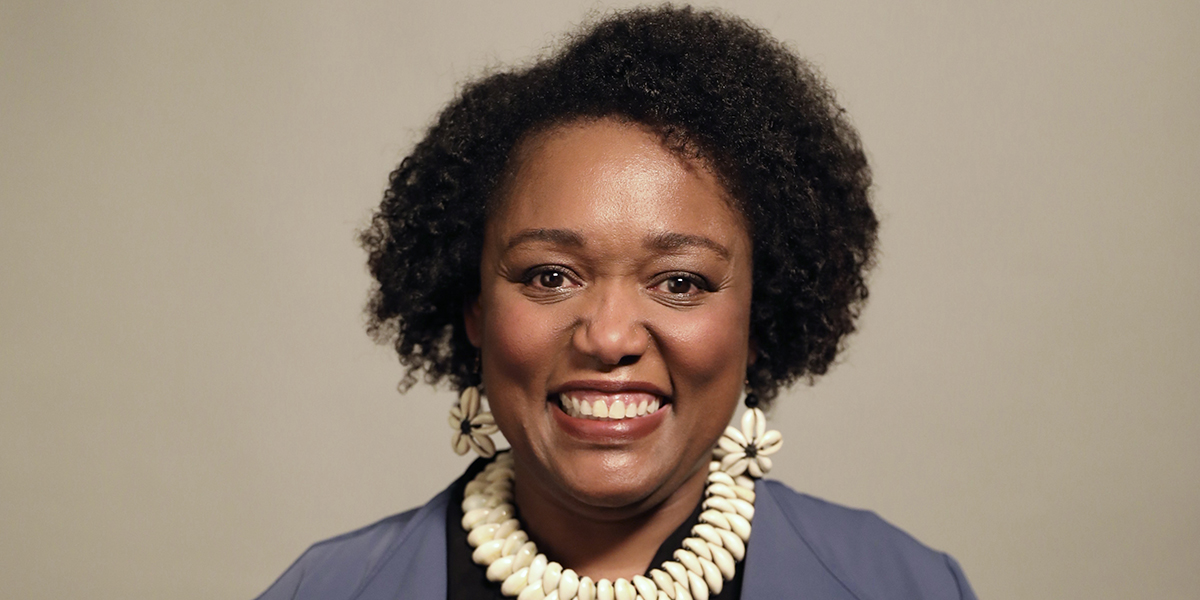Portland Magazine
January 25, 2024
In September, Gloria Purvis spoke about racial justice as the 2023 Zahm Lecturer. She was last on The Bluff in 2022, when she was awarded an honorary doctorate from UP.

AFTER GEORGE FLOYD’S murder in 2020, Gloria Purvis knew she had to speak up. She was a prominent commentator and author, after all, and decided to use her Catholic radio show as a platform to talk about our country’s need for racial justice. Firmly rooted in a pro-life lens, she believes there are no conditions to human dignity. And no exceptions, either. Her audience, mostly an audience of self-identified Christians, did not take kindly to her broaching racial justice on air. She received hate mail from listeners and pushback from her colleagues. The network ended up canceling her show.
But she wouldn’t let that stop her from talking about “the sin of racism,” even if that meant (and still means) challenging her fellow Catholics and her Church to grow, to become better, more just versions of themselves. Of her listeners and colleagues who had responded to her message with vitriol, she merely thought, “These people are in need of conversion.”
After the dust settled from her cancelled show, she found her footing. She’s now the host and executive producer of The Gloria Purvis Podcast, which is distributed by the Jesuit outlet American Media. And while the channel has changed, her message hasn’t. She feels her beloved Church still needs to hear it.
Originally from Charleston, South Carolina, Purvis converted to Catholicism after a mystical experience at the age of 12. She says being born in the state where the Civil War began meant she was always aware of racism. “I lived in a place where it was in the water, in the air. It’s still there, although we like to smile and be polite about it.” But she and her family believed in a different narrative. They believed they were made in the image and likeness of God, that they were fully and wholly loved unconditionally.
There is a relatively small Catholic population in South Carolina, and an even smaller Black Catholic population. She wants her fellow Catholics to ask why this might be, to look to the past to understand the present.
She says it’s important to “recognize that the doors of the Church were not a shield against the sin of racism, that the very practices outside in the secular world were very much practiced inside the church. How can that be in the house of our Lord?” She noted the days when Black Catholics had to sit in certain sections and weren’t allowed to take the Eucharist until after white Catholics had, and talked about how Black men weren’t allowed into the priesthood. “It boggles the mind,” she says, “that we had clergy that…didn’t have the courage to love their white congregants out of that lie.”
She defines “that lie” as the belief that Black people are not made in the image and likeness of God, a lie she sees not only at the root of chattel slavery in the United States, but also in its aftermath. “We as Catholics know that the effects of a sin can outlive the persons who committed the sin.” She defines structural racism using the words of Saint John Paul, who wrote about “structures of sin, built off the choices of individual people over time.” These structures, she notes, are hard to undo, but “undo them we must.”
When asked how she can continue to engage in this work and avoid being consumed by rage and despair, she says, “We are perhaps at some point going to be consumed by rage and despair but not lost to it.” She takes comfort and inspiration in the example of Black Catholics who have come before her. And then she says she “turns to the cross.”
“We can’t look at the Lord walking, carrying the cross and think we need to be free of that. He did that to confront evil to free us. How can I do any less?”
GLORIA PURVIS has served on the National Black Catholic Congress’s Leadership Commission on Social Justice, and she is the inaugural Pastoral Fellow for the University of Notre Dame’s Office of Life and Human Dignity at the McGrath Institute for Church Life.
University of Portland
5000 N. Willamette Blvd.,
Portland, Oregon 97203-5798
503.943.8000
This website uses cookies to track information for analytics purposes. You can view the full University of Portland privacy policy for more information.
